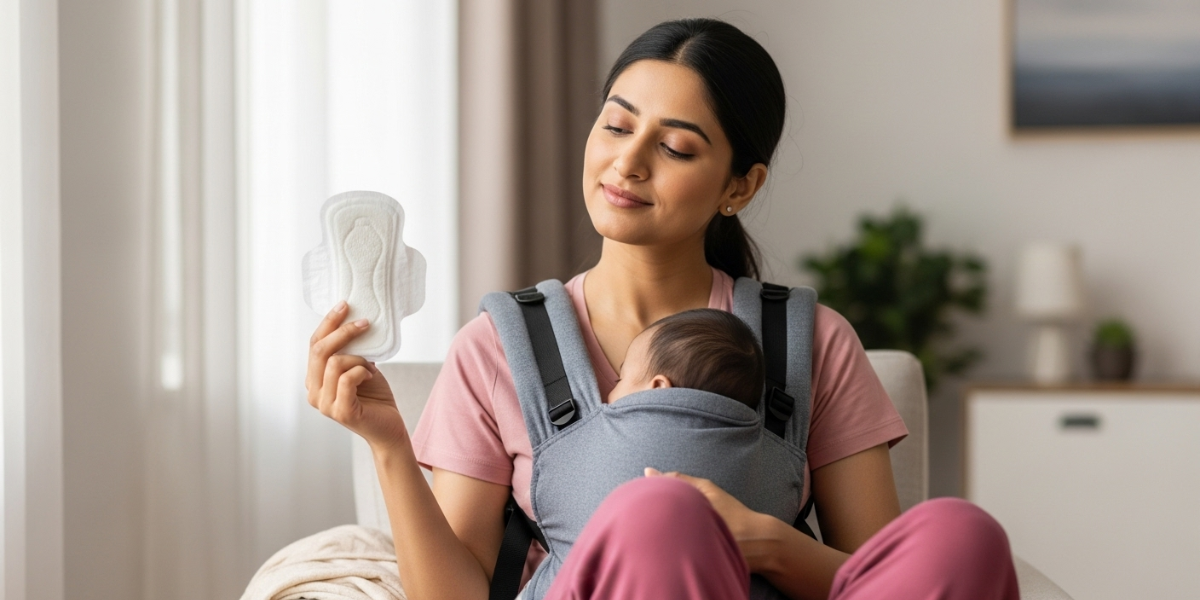
Getting Your First Period After Pregnancy: What Happens & What to Expect
|
|
Time to read 3 min
|
|
Time to read 3 min
After nine months of no periods, it’s natural to wonder “when will your first period after pregnancy return?” The answer isn’t always straightforward. Every woman’s body is different, and various factors like breastfeeding and hormone levels can impact the timing.
For moms who aren’t breastfeeding , your period might return as early as 6-8 weeks postpartum .
If you're exclusively breastfeeding , your period may not return for several months , sometimes even up to a year or more.
Yes, breastfeeding triggers the release of prolactin , the hormone responsible for milk production. Prolactin suppresses ovulation , which can delay your menstrual cycle.
Moms who breastfeed frequently , especially at night, are more likely to experience a longer delay in the return of their periods.
It’s important not to confuse lochia, which is postpartum vaginal discharge, with your first period. Here’s how to differentiate:
Feature |
Lochia |
First Period After Pregnancy |
Duration |
Up to 6 weeks |
3-7 days |
Flow pattern |
Gradually reduces over time |
Starts and stops like a period |
Colour |
Starts red, turns brown/white |
Red or dark red |
Accompanied by |
Tissue, mucus |
Menstrual cramps, PMS symptoms |
Your first period after pregnancy may be different from what you remember:
Heavier bleeding than usual
More intense cramps
Blood clots
Irregular cycle duration
PMS-like symptoms (bloating, irritability, fatigue)
Yes. Ovulation happens before your first period , so you can get pregnant even without having menstruated postpartum.
If you're sexually active and not ready for another pregnancy, consider contraception options after consulting your doctor.
Postpartum recovery and hormonal rebalancing require nutrient-dense foods :
Iron-rich foods : Dates, jaggery, green leafy vegetables to replenish blood loss
Calcium : Ragi, sesame seeds, dairy to support bone health
Healthy fats : Ghee, nuts, seeds for hormone production
Traditional herbs : Saunth, Shatavari, Gond help nourish and regulate the body
Tip : A warm bowl of Momix Kheer daily is a delicious way to support hormonal recovery and period regulation.
Reach out to your gynecologist if:
Your period hasn’t returned 3 months after stopping breastfeeding
You're experiencing heavy bleeding (soaking a pad per hour)
You're dealing with severe cramps or blood clots
You feel dizzy, weak, or develop a fever
1. Can getting my period reduce breast milk supply?
Yes, for some moms, a temporary dip in milk supply may occur due to hormonal changes. Increase hydration, feed frequently, and include lactation-supporting foods.
2. Is it normal to have irregular periods after pregnancy?
Absolutely. Your hormones may take months to stabilize. This is especially common if you're still breastfeeding.
3. Will my periods go back to normal eventually?
Yes, most women find their cycles stabilize within 6-12 months postpartum .
4. Can I use tampons or menstrual cups for my first period?
If you’ve fully healed from delivery (especially after a vaginal birth), you can resume using tampons or cups. Always consult your doctor if unsure.
5. What if I haven’t had my period for a year postpartum?
If you're not breastfeeding and haven’t had your period for over 3–6 months , it’s worth checking with your doctor for hormonal imbalances or other concerns.
The return of your period postpartum is a sign of healing , but it can also be confusing. Whether it returns early or late, heavy or light - know that it’s your body’s way of resetting. Focus on nourishing foods , rest, and checking in with your doctor if anything feels off.